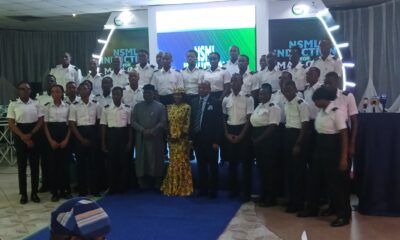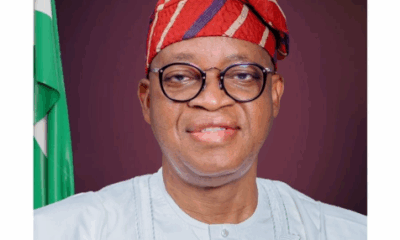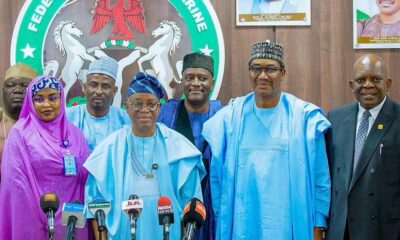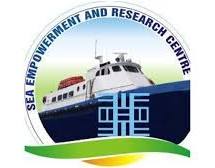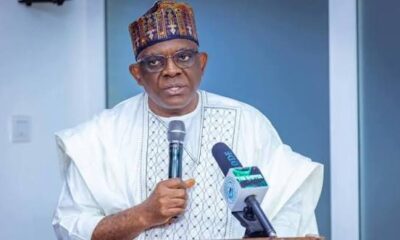Shipping
Imperative Of The Nigerian Shippers’ Council Act Review
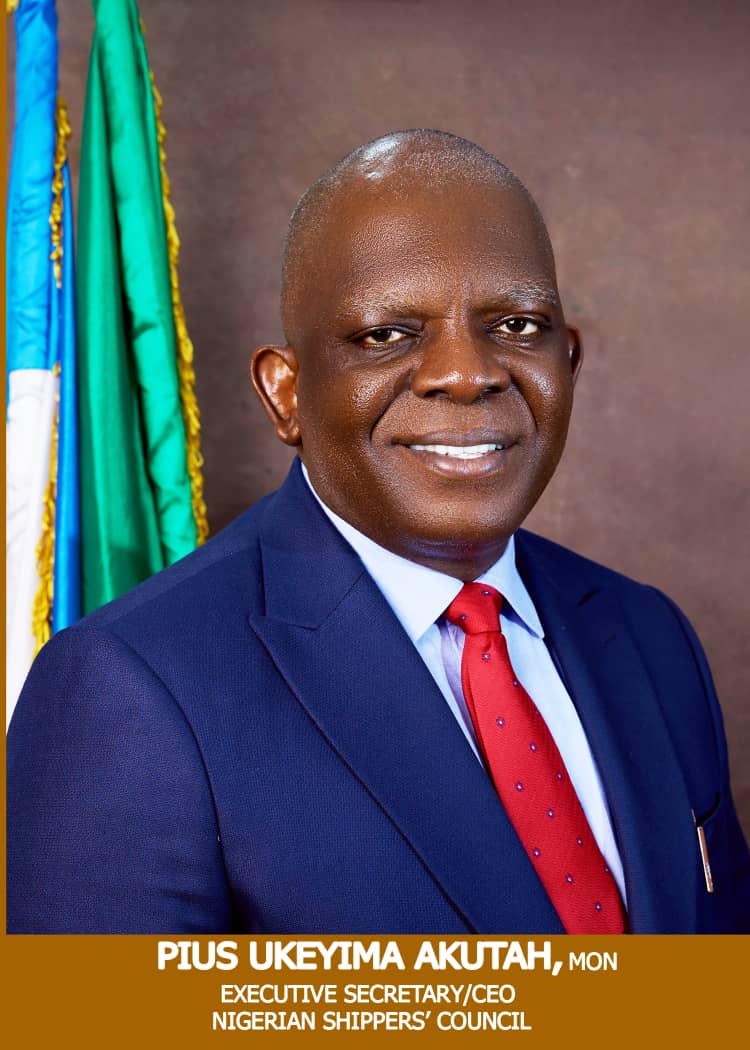
BY EGUONO ODJEGBA
Since the return to democracy in 1999 critical sectors of the national economy presided over by foreigners are known to have operated with little or no respect for the rules of engagement, ethical restraints and or best practices.
First, it was the foreign shipping companies, and after the balkanization of the ports in 2006 under the reform agenda of the government at that time, the seaport terminals, dominated by foreigners joined the bandwagon of those who openly disregarded and deride government and all its agencies established to regulate the conduct of port and shipping trade.
They openly challenge institutional and operational rules, rebuffs inspection and sanctions, and behave generally as entities that answers to themselves and no one else. Evidence abound that they not only ignore and neglect regulatory bodies, but also scoff at every effort to get them to the dialogue table, while very often, they even challenge the authorities and the Nigerian system in respect of observed breaches and high handedness.
Like the international oil companies, IOCs, the shipping companies and terminal operators don’t answer to nobody and are seen generally as above the law; and untouchable!
Over the years, Nigerian shippers have remained victims of economic bondage as the foreign shipping companies and terminal operators impose on them oppressive and exploitative regime.
At their whims and caprices and with no justification, they slam arbitrary charges on the shippers who are helpless due to the obvious slack in effective governmental regulatory framework.
It will be recalled that owing to this weak regulatory atmosphere flowing from perceived, official corrupt posturing by Abuja, some of these foreign operators believed to be supported by corrupt local partners and lackeys openly challenge Nigerian Shippers’ Council, and has even dragged the Council to court a number of times; relying as it were our equally weak judicial system.
Thus overtime these foreigners who should actually be partners in development have shown a disposition to be more concerned about themselves and the milking of the Nigerian economy; whilst fighting to obstruct any purposeful regulatory framework to provide an effective monitoring and efficient adjustments in the national economy.
It was not unexpected that these operators and their corrupt local backers would seek to fight against in the most harassed manner, the legislative consideration to review and rework the NSC Act to fit best practice where all stakeholders can have a sense of belonging.
Pundits have for a long time already identified their unspeakable arrogance and disregard for laws, as also a subtle disregard for our sovereignty as a people as some of the reasons that has undermined our development and lack of economic growth.
Sadly, complacent leadership disposition and lack of political will has served to embolden them overtime, to the extent that the regulatory agencies have become lukewarm whilst these operators capitalize on these weaknesses to continue to manipulate and exploit the system.
Observers say above scenario account for reasons Nigerian shippers have remained in the shackles of operational bondage, even as the Nigerian Shippers’ Council, established to cater for their interests of shippers and to protect them from undue exploitation have remained a ‘lame duck’, so to speak.
These foreign operators not only regularly engage in manipulative and exploitative tendencies that render local shippers and port traders vulnerable, but in addition have been accused of systematically milking the nation; whilst Nigeria watches helplessly.
Their manipulative and oppressive tendencies and condcut is so glaring in the face of regular arbitrary charges slammed on shippers; actions that often evoke emotional repulsion in citizens, who are forced to ask whether indeed, Nigeria has a functional government.
Exploiting the weakness identified in the Nigerian Shippers’ Council Act, aside the inchoate statute that granted it the ports economic regulator status, these economic actors have ensured that the NSC is rendered redundant.
Thus, in the face of a clear direction and uncertainty demonstrated by our political leadership who between the Nigerian Shippers’ Council and the Nigerian Ports Authority (NPA) should assume the role of an economic regulator; the industry has continued to bleed under their oppressive manipulation and shrewd exploitation.
Bit of respite came in 2014 when the federal government for once, was assertive on the role of the NSC as the industry’s economic regulator. Although the prior administration of Hassan Bello and Emmanuel Jime as ES/CEO of NSC, respectively, made serious effort to secure presidential assent for the necessary amendment of the NSC Act to reflect its role as economic regulator, President Muhammadu Buhari, believed to have acted under unethical influence brought to bear upon him by entrenched interests, wasted the golden opportunity to give the industry a new sense of direction.
The effort which continued this year under the incumbent ES/CEO NSC, Barr. Pius Akutah and under the salutary guidance of the Minister of Marine and Blue Economy, Adegboyega Oyetola has so far attracted some positive returns with the passage of the second reading of the Nigerian Shipping and Port Economic Regulatory Bill by the House of Representatives.
Sponsored by a no less a person than the Speaker of the House, of Representatives, Alhaji Tajudeen Abbas, the bill seek to repeal the Nigerian Shippers ‘Council Act (Cap N133, LGN 2004); and is generally designed to empower the Shippers’ Council to regulate the activities of operators and players, including service providers and to birth the real growth of the industry.
The draft bill also seek to end the regime of oppressive operational climate of naked exploitation of shippers and the nation; and to usher in an air of guaranteed utmost fidelity, fair deal and protection of all stakeholders.
Although the proposed bill stirred up quite some fuss as those gaining from the old order mounted stiff opposition to its passage, it scaled through public hearing on May 27th, 2024.
Whereas opponents and the nay-sayers, ultimately appeared to have backed down, considerably, there are still concerns that they may yet create problem.

The Maritime Advocacy Foundation, MAF, which had earlier loudly opposed the bill, has actually a night before the public hearing, reconsidered, apparently based on superior argument presented by the other side.
It is salutary that the Head of Publicity MAF, Dr Eugene Nweke, also participated at the public hearing and spoke in favour of the necessity of reviewing the NSC Act to make it possible for the Council to achieve the desired repositioning in view of its positive ripple effects on the industry and on national growth.
It is hoped that the Committee on Ports and Harbour known to have also opposed the important amendment of the NSC Act, see reason to adopt a more patriotic and purposeful rethink to support the draft bill until it is passed into law.
It is also noteworthy that the indigenous shipping community has remained steadfast in the struggle to achieve an efficient turnaround in the industry through the envisaged legislative review.
Hon. Abdussamad Dasuki, Chairman of the Committee on Shipping Services who supervised the public hearing assured that for every well meaning stakeholder and Nigerians, the passage of the bill is good news.
Speaking with reporters after the public hearing in which notable Nigerians and industry technocrats attended in their large numbers, the committee chairman said that the bill will be beneficial to everyone interested in the development of the industry.
He explained that the whereas the committee is still open to constructive ideas and proposals, he urged those with positive input to come forward with their submission since it is still collating memoranda from stakeholders on the amendment, ahead of presenting its report to the House for the third Reading of the bill.
Dasuki said, “We are still collating memoranda. You know the next process is to present the report to the House of Representatives for consideration.
“The Public Hearing today showed that every stakeholder in the Nigerian Maritime industry wants an economic regulator for the industry. The era of impunity has to stop. There were no concerns from everybody. The stakeholders’ inputs were very useful and educative for us today.
“The Bill seeks to repeal a law which is preventing the Nigerian Shippers Council (NSC) from enforcing a presidential directive concerning economic regulation of the ports. Nigeria’s maritime industry is overdue for this, and we will see to its implementation.”
The Honourable Minister of Marine and Blue Economy, Adegboyega Oyetola had during the hearing explained that the new bill is designed to enthrone an efficient regulatory framework for the marine and blue economy industry.
He noted that the ministry is always ready to partner with stakeholders to achieve a robust sectoral growth through clearly defined policy and operational framework that is growth oriented, sustainable and nationalistic in outlook.
His words, “The Ministry of Marine and Blue Economy is willing to partner with all stakeholders in the sector, especially the National Assembly, to enthrone regulatory framework for the Marine and Blue Economy industry.
“It is on this note that we are eager and very happy to be a part of the process that will reform the sector. The Ministry is in the process of collating its considerations on this Bill and submit accordingly.
“We will encourage all stakeholders to also contribute their quota towards the actualisation of this process for the interest of the nation.”
Also speaking, the Executive Secretary/CEO of the NSC, Barrister Pius Akutah assured that concerns raised by stakeholders would be accorded sufficient attention in the overall interest of the nation.
“I am very impressed with the outcome of today’s Public Hearing. I am particularly grateful to my Minister, the Honourable Minister of Marine and Blue Economy, Adegboyega Oyetola for his support.
“It is also one of the Key Performances Indicators that we signed with the Honourable Minister. On some concerns raised by some stakeholders, some of them are germane and will be looked at going forward.
“We are not bringing in a law that will strangulate the sector. The intention is to bring sanity to the sector and to ensure that the sector is booming.”
Stakeholders from the various sub sectors of the industry, including shipping, freight forwarding, maritime law, maritime media and the allied sectors were in attendance.
Given the pendency of the legislative consideration of the repeal of the NSC Act together with informed worries about the possibility of new tricks by entrenched interests to derail the process, positive stakeholders, especially the NSC, must be seen to remain vigilant and prepared. Even stakeholders that have so far been very supportive have acquitted themselves so well and so far should be encouraged to remain steadfast and not to cave into pressure to capitulate at the eleventh hour.
Nigeria has suffered the indignity of parliamentary sellout at critical hours in the past, the industry is yearning for a new direction and can ill afford such behaviour now.
All stakeholders of goodwill must stand out now as during the last public hearing of the bill.
Notable amongst the attendants are former Managing Director of the NSC and Nigerian Ports Authority (NPA) Adebayo Sarunmi, former Executive Secretary/CEO NSC, Barrister Hassan Bello, former National President of the Association of Nigerian Licensed Customs Agencts, Price Olayiwola Shittu, Barr. Emeka Akabogu, Elder Asu Beks, amongst others.

